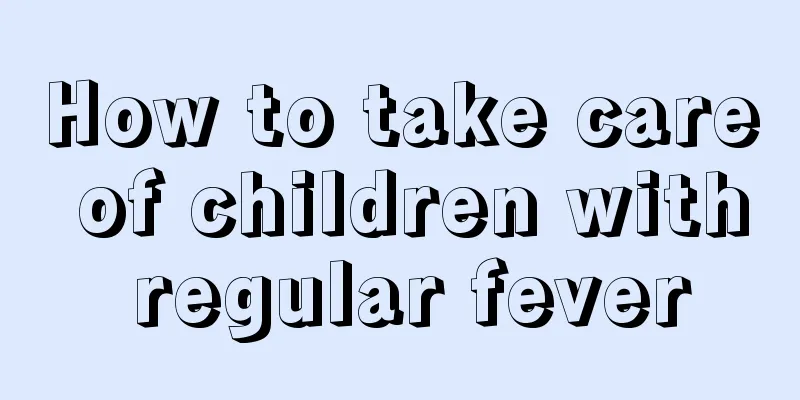Can enteritis cause fever in babies?

|
When a child develops enteritis, it is often related to unclean diet, and of course it may also be related to catching a cold. If the condition is more serious, inflammation will often occur, causing the baby to have a fever, and often leading to nausea, vomiting and diarrhea. If the condition is more serious, it may even lead to dehydration and electrolyte imbalance. Therefore, the harm is relatively large, and timely medication and water replenishment are required. Let's take a look at this aspect. Can enteritis cause fever in babies? There are many reasons for children's fever. In addition to colds and pneumonia, fever caused by gastroenteritis is also common, especially in infants. Especially for children, improper diet and weak spleen and stomach cause food to accumulate in the stomach and intestines. It cannot be digested and accumulates and ferments in the stomach and intestines, generating heat energy and fever. Infants and young children are most likely to suffer from fever. This fever causes hot palms and limbs, unlike a cold which causes cold limbs. The fever will subside and the patient will recover after the food is digested. Gastroenteritis, with typical symptoms of vomiting and diarrhea, is usually caused by a gastrointestinal virus, the most common of which is rotavirus. Apart from this, it may also be caused by other reasons such as bacteria, parasites or mild food poisoning. Most babies will be infected at least once before the age of 3. It is very similar to the flu in that it is contagious, may cause fever, and is affected by the season. It's just that the flu is caused by a respiratory infection. Because the child's immune system is not yet fully developed, the first infection may also be the most dangerous. The virus is spread through saliva or feces, so the initial symptoms are vomiting, low-grade fever, and then intermittent diarrhea. It is not completely impossible for children to take antipyretics when they have a low fever. Similarly, there is no clear conclusion on whether children can take medicine when they are vomiting. But you must be careful when choosing medicine. For example, ibuprofen may irritate the child's stomach, so it is best not to feed him medicine when he is only experiencing nausea symptoms. If a child with gastroenteritis vomits for more than 3 days, has diarrhea for more than 7 days, has a fever for more than 2 days, has green vomitus, or has severe stomach pain, he or she must go to the hospital for examination in time. Remember that if your child is vomiting and has diarrhea, or has a persistent fever, he or she is likely to be severely dehydrated. In addition, if the child has blood in the stool, it may be a bacterial infection and needs to see a doctor immediately. How to treat baby gastroenteritis 1. Pay attention to fluid replacement and avoid dehydration Pay attention to dehydration symptoms: whether the child urinates less (the baby needs fewer diaper changes), cries without tears, has dry and inelastic skin, or has a sunken fontanelle. Regardless of whether the child has received an IV drip or not, you can buy electrolyte water specifically for diarrhea and give it to your child to drink as water. An IV may be necessary if a child's level of consciousness is decreased or if dehydration is severe. But oral rehydration therapy is still a good way to replenish fluids. Drinks high in simple sugars, such as soda, fruit juice, etc., are not recommended for children under 5 years old because they may worsen diarrhea. If there is no special oral rehydration solution or it tastes bad, plain water can also be used. If indicated, nasogastric tubes can also be used in children to supplement fluids. 2. Pay attention to diet and continue breastfeeding Breastfed babies are advised to continue feeding as usual. Formula-fed infants should continue formula feeding immediately after ORT rehydration. You can try brewing it with half milk (i.e. diluting the concentration by half) first. If the diarrhea condition does not improve within 3-7 days, you may need to switch to lactose-free milk powder (i.e. commercially available laxative milk powder) under the doctor's instructions. 3. Antiemetics Antiemetic medications may help treat vomiting in children, but they must be taken as directed by your doctor. Ondansetron has some utility, with a single dose reducing the need for intravenous fluids, hospitalization, and vomiting. However, the use of ondansetron may be associated with an increased risk of hospital readmission in children. If clinically necessary, ondansetron can also be administered orally in the intravenous form. Metoclopramide may be effective. 4. Antibiotics Antibiotics are not routinely used for gastroenteritis but may be recommended if symptoms are particularly severe or if a susceptible bacterium is identified or a bacterial infection is suspected. The World Health Organization (WHO) recommends that antibiotics be used for children who have both blood in their stools and a fever. 5. Antidiarrheal drugs Do not use antidiarrheal medicines in children—they may be dangerous. Antidiarrheal drugs have a theoretical risk of complications, although clinical experience suggests that this is unlikely, and are not recommended in cases of diarrhea with blood in the stool or fever. Loperamide is an opioid analog commonly used for the symptomatic treatment of diarrhea. However, loperamide is not suitable for use in children because the drug may cross the immature blood-brain barrier in children and cause toxicity. Children's gastroenteritis is much more complicated than adult gastroenteritis, so be sure to see a doctor. |
<<: Why does the child lose his breath when he cries?
>>: The child has difficulty breathing. What's going on?
Recommend
How many months does a baby start to cry?
Many parents have many puzzles in the process of ...
What to do if your four-month-old baby refuses to drink milk powder
When choosing a feeding method, most mothers will...
Reasons why babies wake up suddenly and cry during sleep
Many parents find that their babies suddenly wake...
Causes and treatments of bad breath in babies
The baby's bad breath may be caused by indige...
What to do if children have toothache
Children nowadays do not pay attention to their p...
What should I do if my 5-year-old child has encephalitis?
There are so many electronic products nowadays, s...
The white of the baby's eyes are a little yellow. Is jaundice serious?
Newborns have fragile and sensitive bodies and ca...
When does the baby's fontanelle close?
According to the editor's understanding, newb...
A bump on the head
For children, there are always times when they ar...
Complications of bacillary dysentery in children
Bacterial dysentery is relatively common in child...
At what age will the baby start laughing out loud?
Many parents are concerned about their children&#...
Young parents, please remember this recipe for your baby’s fever!
Nowadays, many young people are raising their chi...
What is the best time and method to treat torticollis in children?
In daily life, more and more parents are concerne...
One-year-old baby eating grapefruit
Grapefruit tastes sour and sweet, and it is very ...
How to rule out giant intestinal congestion in babies
Many people don’t know how to eliminate giant ent...









